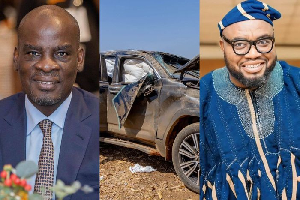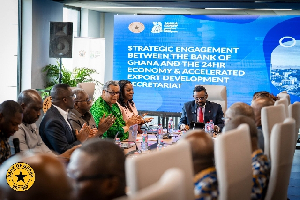Samuel Owusu appeared on the Ghanaian music scene with a string of instant smash hits from “Abusua Kyiri Ka,” “Mempe Me Ho Asem,” “Kokosakyi,” “Asem Beba Dabi,” “Yenka Wo Ntie No” to “Mo Bekae Me.” We may broadly classify the repertoire of his music genre as burgher-highlife.
Yet, although the music for his classic songs is heavily based on computer-generated beats, no true lover of good music can deny the sheer soulful power of his messages, as well as the fact that the emotional melody of his lyrical power is also undeniably profoundly electrifying and earth-shattering.
In other words, the language of his music has philosophical and cultural depth and hortatory richness. The topical range of his repertoire and allegorical lyricism leave much to be desired.
Samuel has profound native proficiency of Twi and the lyrical messages of his repertoire draw heavily upon imagery pertaining to the animal world, moral values, the natural world of fauna and flora, biblical references, the social and the spiritual and last but not least, to folk wisdom, metaphor, colloquialisms, idiom, indirect speech acts, and finally, to cultural references.
Here is Samuel Owusu in a recent interview:
“I started coming out with albums in 1992 when I was 25 years, someone saw me and claimed he thought I was an old man by now, but that is never the case. The truth is that I walk with and converse with old men and women and that makes me talk like them.”
As a matter of fact this gifted singer is culturally precocious in that his songs, especially “Abusia Kyiri Ka,” if and when listened to closely can lift the Sisyphean weight of the human soul to another plane higher than the pedestrian, the ordinary, even as it prevents the human soul from drowning under that Sisyphean weight. “Yenka Wo Ntie No” is another powerful classic of his.
The subtle bass line and drum syncopations at the beginning of the song, “Abusua Kyiri Ka,” brings us closer somewhat to that of rapper Jay Z’s “Hard Knock Life” and Bob Marley’s “One Drop,” respectively.
Listen to Bob Marley on “One Drop”:
“So feel this drumbeat, as it beats within, playing a riddim…”
Samuel’s lyrical frankness and powerful messages can unnerve the slothful stubbornness of any human soul that loves good music and force it to its feet in a responsive gesture of dancing jamboree. This is largely because his conscious lyrics are empowering and speak truth to power.
Again, the central message of “Abusia Kyiri Ka” is absolutely right, damn right! This militant frankness is largely missing in the contemporary music genre of hiplife, say.
Simply put, his songs tickle the human soul in a way that most hiplife songs, perhaps, do not do.
Here is Samuel Owusu again:
“I have been around all this while and have been working on my songs, I perform on platforms when I am invited but truth is that Ghanaians hardly like songs with sensible lyrics…
“I have never been awarded at the Ghana Music Awards, why is it so…maybe to me it’s because I make too many sensible songs which Ghanaians perhaps do not like.”
In spite of the heavy mechanization of his music, Samuel Owusu’s signature highlife remains true to the rootsy intellectualization of hortatory lyricism in the vein of traditional highlife and palm-wine music.
Yet he also takes after the lyrical fearlessness of Peter Tosh, Fela Kuti, and Bob Marley.
That is to say, his music remains one of the few in the stupendous repertoire of Ghanaian music to carry the true weight of folk wisdom and conscious lyricism.
Indeed this is a profound singer hiplife singers, producers, songwriters, performers, musicians and promoters should learn from.
Significantly, his sparring deployment of elements of antiphonal or call-and-response techniques between his captivating vocal patterns and his backing vocalists or singers is interesting, aesthetically phenomenal.
He also has the harmony, the melody, the rhythm, and the tone quality that fuel his inner yearnings for social equilibrium in relationships. This is hardly a fixture of contemporary hiplife.
In the meantime he does minimal griot praise-singing or rhapsodized singing in his classic repertoire, thus placing him somewhat in the category of influential musical raconteurs such as America’s folk singer Bob Dylan and Pete Seeger and Ghana’s own Nana Kwame Ampadu and Koo Nimo.
Of course, Nana Kwame Ampadu’s topical range is relatively wider than Samuel Owusu’s because he has had a relatively longer tenure in the music or entertainment industry and a broader repertoire.
Put succinctly, his [Samuel Owusu’s] impressive repertoire lacks the universal materialistic braggadocio and crackling cacophony we have come to associate with hiplife.
The important idea is that he addresses his conscious music exclusively to social and spiritual matters mostly.
In fact any good song does not only entertain the soul and body of mortals, it also entertains the human mind and forces it into a framework of deep or sober reflection on the human condition.
It attempts to raise as well as address some of the knotty issues human beings encounter in their lives.
Lyrical analysis of his music or semantic analysis of his rich repertoire brings one closest to the practical philosophy of folk life and more generally, of common existential beliefs about social philosophy.
It is high time we stressed that Samuel Owusu’s repertoire is mostly critical of social relationships.
It takes the sociology of knowledge to also appreciate the material and spiritual depth of his impressive musical repertoire.
More important also, the proverbial depth of his dense lyrics bespeaks a curious, rich and absorbent mind than had stayed in close propinquity to a wellspring of native intelligence and wisdom.
At this point in time let us make it clear here, that he therefore does not sing just about anything for the sake of singing.
His songs are fundamentally topically deep, many and various and point to the wandering mind in many directions about the facts of social life, of the complexity of human nature.
Indeed the poetry of life, of human existence is not always rosy but a complex one as well. His songs do not shy away from these basic facts.
As a result he produces songs and albums at a calculating pace, to ensure that the final product meets social expectation, although the current generation somehow thinks musical prolificacy or quantity is necessarily synonymous with quality.
Great musicians like Bob Marley did not buy into that! Perhaps this explains why artistic productions from such creative minds are timeless.
Finally, and rather provocatively interestingly, unlike Ofori Amponsah, K.K. Kabobo, Lord Kenya, and Azigiza Jr., Samuel Owusu never has allowed his purported Jehovah’s Witnesses faith to undermine his natural talent.
Food for thought
It is sad how Ghanaians do not generally patronize their own, namely, the musical greatness and aesthetic timeliness of the older generation of musicians some of whom were/are sophisticated lyrical rhapsodists, others complicated lyrical raconteurs, and still others virtuoso and versatile instrumentalists.
Eric Agyeman was, and still is, such a great guitarist from the older generation. So too are Ebo Taylor and Koo Nimo.
Guy Warren was such a complex versatile drummer. So too is the gome drummer and folk musician Nii Adu Ofoliquaye (“Big Boy”) of Wulomei (and of The Bukom Ensemble).
Kiki Gyan of Osibisa fame was such a gifted pianist—keyboardist.
The list of virtuoso and versatile instrumentalists, sophisticated lyrical rhapsodists and raconteurs and songwriters from the old school is almost endlessly long…even as we have world-famous record producers and recording artistes such as Alicia Key’s husband, Swizz Beatz, hinting sometime last year (2015) of sampling Ebo Taylor’s “Love and Death” album…
And even as we also have African-American record producer of Nigerian ancestry, Bangladesh, and Sean Garrett, one of the most respected number one-hit producers in American music history (besides Beatle’s Sir George Martin and three others among the top five), sample Ebo Taylor’s “Heaven” for Usher’s “She Don’t Know”!
Finally, while we pretend that these creative musicians and their large body of works do not exist, Western musicologists, instrumentalists, composers, historical musicologist and the general public do in fact celebrate them and their works and also make good use of these works in theirs.
We ignore them, reject their creative works, and even dismiss their rich body of works as made exclusively for the unrefined, unsophisticated villager and illiterate (unlettered), that highlife is not for cosmopolites, situations not unlike the shameful manner by which we derisively dismiss the African-centered academic study of the performing arts at the University of Ghana as “dondology” (and professors and students and researchers associated with this department).
Some even call traditional highlife and palm-wine music “Kokoasefuo Enyom,” “Nkruasefuo Enyom” or “Kokoase-Nkrusafuo Enyom,” literally rendered here as “villagers’ music” or “village people’s music.” Yet it is just acceptable for a British, John Collins, to carry out intense research into our musical traditions at the same university and to promote highlife across the world.
The white man on the other hand calls his classical music “art music,” “canon music,” “serious music,” “erudite music,” “real music,” while in some quarters he dismissively refers to “highlife,” a Ghanaian classical music, as vernacular music. Eurocentrism and cultural de-centeredness of the African mind are partly to blame for this negative trend in framing our worldview.
This neglect, a national “crime” in our opinion, of the new generation is a shamefully unpardonable blot on the national conscience and our cultural institutions.
The older generation left their rich legacies for the contemporary generation, anyway.
What is this generation doing about them? Of course, members of the new generation need to fashion their own unique musical identities and brands peculiar to the hiplife dispensation but, as we may all be aware, it does not hurt at all to learn from the masters of the older generation.
Conclusion
Having said that, the overt and covert overlaps between the older generation and the new generation is seldom acknowledged by contemporary music critics/music journalists and even by members of the new generation:
Sarkodie brags on “You Go Kill Me” and Senior Eddie Donkor indirectly had two anonymous characters on his track “Asiko Darling” do same.
Obrafour’s “Kwame Nkrumah” celebrates Osagyefo Kwame Nkrumah, “Africa’s Man of the Millennium,” and Ebo Taylor’s “Kwame” does same.
A.B. Crentsil’s “Moses,” Rex Omar’s “Abiba,” Daddy Lumba’s “Dr. Panie” and “Asee Ho” and “Ride Me,” and Kojo Aquai’s “Anadwo Na Fi” versus Shatta Wale’s “Wo Maame Twe.”
Ewura Ama Badu’s “Medofo Adaadaa Me,” Nana Tuffour’s “Me Yere Dada,” and Slim Young’s “Bisa” versus Ofori Amponsah’s “Otoolege” all deal with problems and complications in conjugal-romantic relationships.
A.B. Crentsil’s “Atia” versus Sarkodie’s “Asante Ni.”
Yamoah’s “Serwaa Koto,” Nana Ampadu’s “Agatha,” Slim Young’s “Odo Ankasa” and “Odo Ye De,” Nana Aboagye Dacosta’s “Odo Me Ne Wo Beko,” Obouba J.A. Adofo’s “Ankwanobi” and “Nko Ngya M’Akyir” versus “Daasebra Gyamenah’s “Kokooko” and Obrafour’s “Pimpinaa (with Bisa Kdei) and Bisa Kdei’s “Odo Carpenter.”
“King of Rhythm Power” and gifted guitarist Senior Eddie Donkor’s “Menom Kooko” versus Sister Deborah’s “Ghana Jollof.”
A.B. Crentsil’s “Anyen” versus Bisa Kdei’s “Metanfo.”
Kofi Sammy’s “Yellow Sisi” versus Obinini’s “Wayuusu.”
Gyadu Blay Ambulley’s “Simi Rap” and Wanluv da Kubolor’s “Broken Language”?
Ace guitarist Dr. Paa Bobo’s “Asobro Kyee” and Ofori Amponsah “Otoolege.”
After all, is hiplife not a marriage or fusion of hip hop and highlife?
REMINDER
We shall return with the last but one installment, Part 3, which takes a look at some general observations.
References
Ghanaweb. “I Don’t Make Enough Money From Music—Samuel Owusu.” August 23, 2016.
“I Have Not Been Awarded Because I Make Songs With Sensible Lyrics.” August 23, 2016. www.adomonline.com
Ghanaweb. “Swizz Beatz Hints At Sampling Ebo Taylor’s “Love and Death” Album.” June 17, 2015.
Kweku Darko Ankrah. “Salute ‘KING OF RHYTHM POWER’ Senior Eddie Donkor.” Retrieved from http://www.blakkpepper.com/2016/04/salute-king-of-rhythm-power-senior-eddie-donkor/
Opinions of Saturday, 3 September 2016
Columnist: Kwarteng, Francis
Highlife legend Samuel Owusu’s social philosophy of music - Part 2
 File photo
File photo














